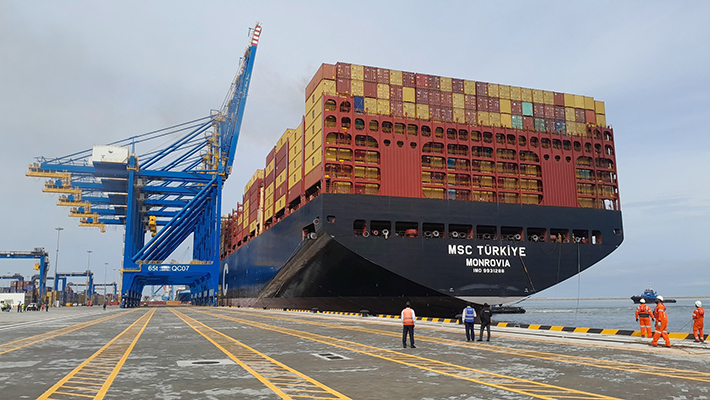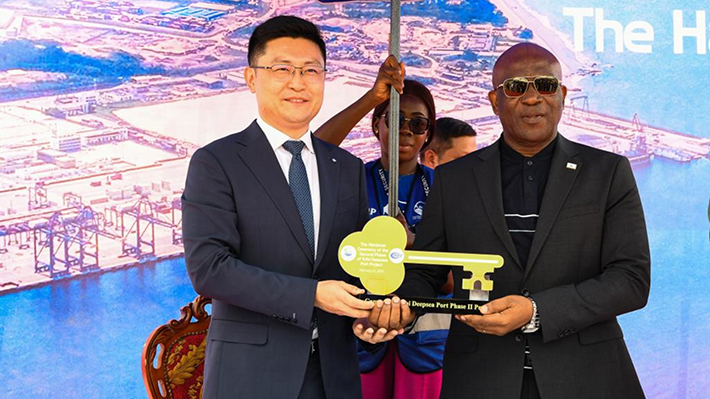A Giant Shore


With a 715-metre quay and a draught of 16 metres, the Autonomous Port of Kribi (APK) stands as one of Africa’s most strategically significant deep-water ports. Situated on Cameroon’s Atlantic coast, it offers direct access to international shipping lanes and is designed to handle large-capacity vessels that many regional ports cannot accommodate.
For experts in Cameroon’s port sector, the APK is more than infrastructure: it is a cornerstone of the African Continental Free Trade Area and a catalyst for regional economic integration, trade diversification, and industrial growth.
Phase 2 of this mega-structure went into operation on 9 May. It was officially inaugurated by the Cameroonian Minister of Transport Jean Ernest Massena Ngalle Bibehe, in the presence of the country’s Minister of Finance Louis Paul Motaze, and Chen Ze, general manager of the Central Africa Division of China Harbour Engineering Co. Ltd. (CHEC), the builder of the project.
The inauguration was marked by the docking of the MSC Türkiye, a 400-metre-long container ship that is one of the largest in the world. According to Raymond Mvoubia, safety officer at the Port Authority of Kribi, this arrival demonstrated the APK’s ability to handle very large ships.
Built at a cost of around $800 million, it was 75 percent financed by the Export-Import Bank of China.
An important partner
CHEC is no stranger to major infrastructure projects on the African continent. The subsidiary of China Communications Construction Co. is known for its expertise in a wide range of areas: marine engineering, dredging, road construction, bridges, railways, airports and much more. CHEC is present in many African countries and has contributed to the construction of Lekki Port in Nigeria and the Akwaba motorway interchange in Côte d’Ivoire.
In Cameroon, the authorities placed their full trust in CHEC and commissioned it to build phases 1 and 2 of the APK. It is expected that this partnership will continue for planned phases 3 and 4. There is every reason to believe that Cameroonian decision-makers will reaffirm their support for CHEC to successfully deliver the final phases of this colossal project, scheduled for completion by 2040. The total investment is estimated at $14 billion.
Since its opening in 2018, the port has handled more than 1 million TEU (Twenty-Foot Equivalent Units) and around 50 million tonnes of goods, without any incident. This performance is testament to the port’s ability to handle a growing volume of trade with the world’s major markets.
Phase 2 aims to further expand this capacity and establish the port as a leading logistics hub for Central Africa. Recent visits from foreign delegations, including one from the Democratic Republic of the Congo, which explored the possibilities of using the APK as a strategic transit point to open up the north of the country, are testament to this.

High demand
This extraordinary seaport is already in great demand and is attracting a great deal of attention. At the inauguration ceremony for Phase 2, Ngalle Bibehe emphasised the crucial importance of this infrastructure: “The port of Kribi is a strategic project for Cameroon because it will strengthen the country’s port capacities and boost economic growth. The second phase is crucial as it will increase handling capacity and consolidate Cameroon’s position as a regional economic centre.”
Chen hailed the future role of the APK in regional development: “The completion of the second phase of construction is a crucial step in responding to the continued growth in trade and increasing the port’s handling capacity. Today’s handover is not an end point, but a new beginning. We will continue to support the Cameroonian government in optimising facilities and improving port services to provide more efficient and practical logistics solutions for our customers.”
The port executive is also very pleased with this partnership between China and Cameroon. “The APK has evolved. In the first phase, we had 615 metres. Today we have grown to 715 metres, which allows us to accommodate denser traffic,” emphasised Patrice Melom, general manager of the Port Authority of Kribi, who also praised CHEC’s “good cooperation and flexibility” during the construction work.
In order to constantly improve the port’s performance, the port authorities are investing in state-of-the-art facilities to increase the site’s capacity. There are plans to expand the multi-purpose terminal to a handling capacity of almost 4 million tonnes. By 2040, an infrastructure with 20 terminals on 6.5 km of quay is to be created that can handle up to 100 million tonnes of goods per year.


